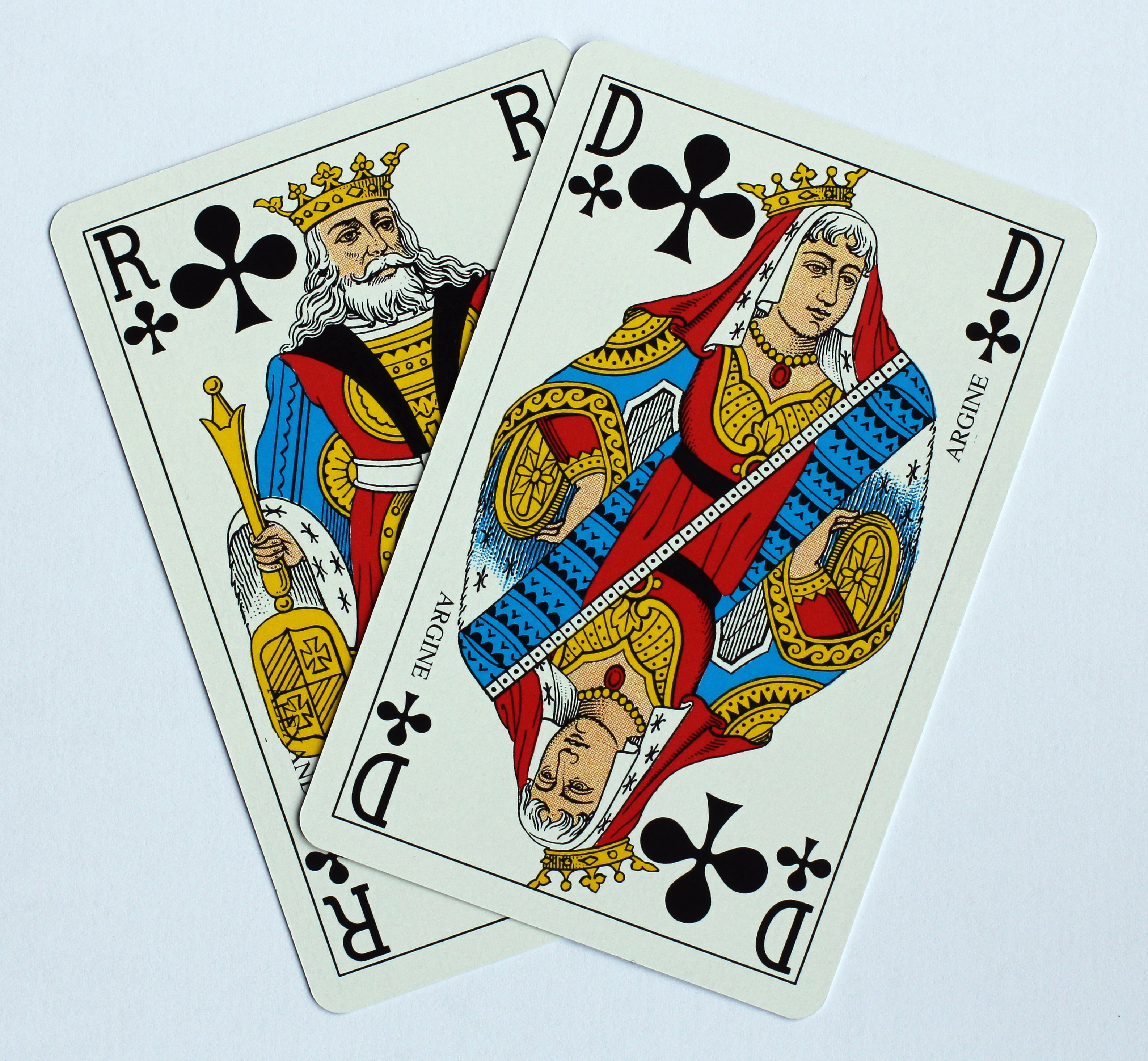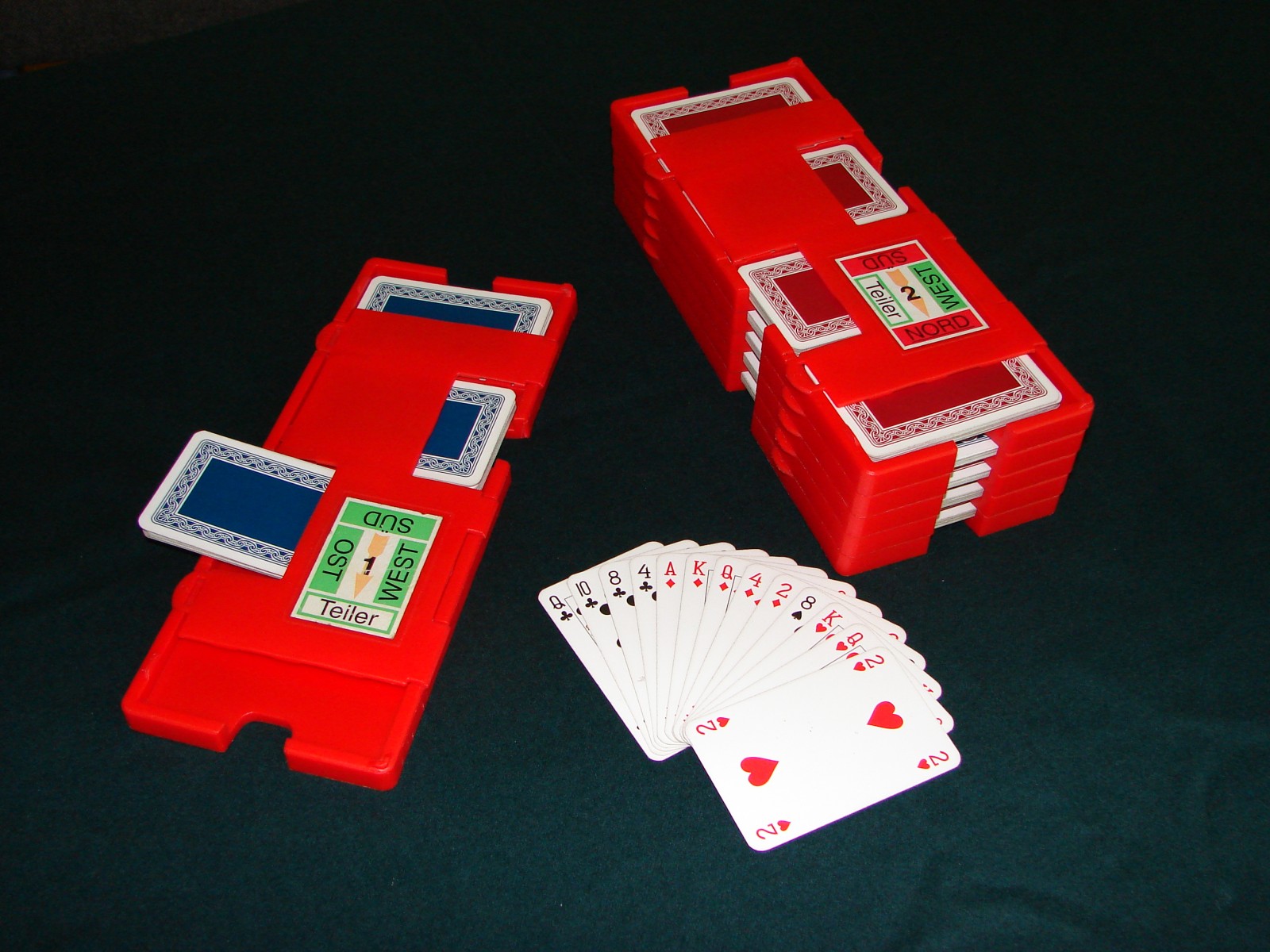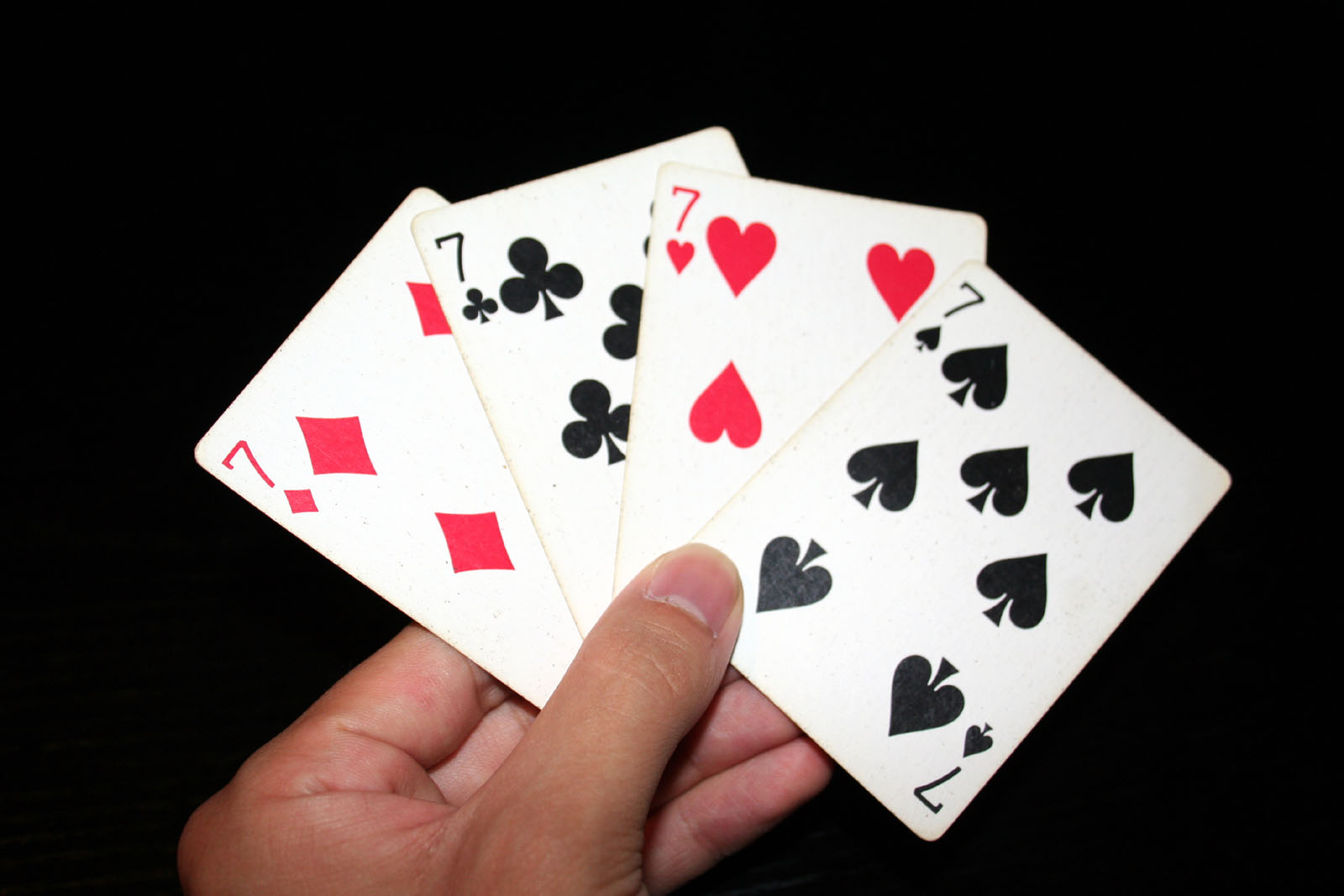|
Baloot
Baloot ( ar, بلوت, balōt ), is a popular trick card game played in Saudi Arabia and in the wider Arabian Peninsula, which is similar to the French game Belote. History of the game Baloot is believed to have been brought to Hijaz by Indian immigrants during the Ottoman Empire, before it spread to all over the country when it was unified under the Saudi rule. Some suggest that it was brought to the area of Hijaz by the Ottomans themselves when they ruled that area. The game There are four players in partnerships of two teams. A standard 32-card set is used, eight for each player. There are two ways of playing "Judges suit, ar, أوراق الحكم / حكم(Hokom)" and "Sǔn ". The suits ranking are : Sǔn (suit) Hokom Assume the Hokom suit is the Sherya (Clubs) (for example) Starting the game The two members of each team are seated across each other at a table in such a way that no player can see the cards of other players . The first dealer is chosen at rando ... [...More Info...] [...Related Items...] OR: [Wikipedia] [Google] [Baidu] |
Belote
Belote () is a 32-card, trick-taking, Ace-Ten game played primarily in France and certain European countries, namely Armenia, Bulgaria, Croatia, Cyprus, Greece, Luxembourg, Moldova, North Macedonia (mainly Bitola), Bosnia and Herzegovina and also in Saudi Arabia. It is one of the most popular card games in those countries, and the national card game of France, both casually and in gambling. It was invented around 1920 in France, and is a close relative of both Klaberjass (also known as bela) and Klaverjas. Closely related games are played throughout the world. Definitive rules of the game were first published in 1921. Within the game's terminology, ''belote'' is used to designate a pair of a King and a Queen of a trump suit, possibly yielding the game's name itself. Variations on the game include Belot in eastern Europe, Baloot in Saudi Arabia, and Pilotta in Cyprus. Deck Much like Skat, German style cards are used widely in former Yugoslav countries as well as Germany (mos ... [...More Info...] [...Related Items...] OR: [Wikipedia] [Google] [Baidu] |
Tarabish
Tarabish, also known by its slang term ''Bish'', is a Canadian trick-taking card game of complex rules derived from Belote, a game of the Jass family. The name is pronounced "tar-bish", despite the spelling. It is played primarily by the people of Cape Breton, Nova Scotia, in Canada, where, according to one source, it was brought in 1901 by a Lebanese immigrant George Shebib. Object The game is over when one or both teams accumulate 500 points or more. Points are counted at the end of each hand and both teams always count their points. The team with the most points at the end of the game wins. The deck A Tarabish deck consists of a normal English pattern deck of playing cards with the 2 through 5 of each suit removed. In preparation for the hand the dealer shuffles the cards in the usual manner. When finished the person to the right of the dealer cuts the cards. The cutter must leave at least four cards in each portion of the deck. Once the cards have been cut, no further shuff ... [...More Info...] [...Related Items...] OR: [Wikipedia] [Google] [Baidu] |
Trick-taking
A trick-taking game is a card or tile-based game in which play of a ''hand'' centers on a series of finite rounds or units of play, called ''tricks'', which are each evaluated to determine a winner or ''taker'' of that trick. The object of such games then may be closely tied to the number of tricks taken, as in plain-trick games such as contract bridge, whist, and spades, or to the value of the cards contained in taken tricks, as in point-trick games such as pinochle, the tarot family, briscola, and most evasion games like hearts. Trick-and-draw games are trick-taking games in which the players can fill up their hands after each trick. In most variants, players are free to play any card into a trick in the first phase of the game, but must ''follow suit'' as soon as the stock is depleted. Trick-avoidance games like reversis or polignac are those in which the aim is to avoid taking some or all tricks. The domino game Texas 42 is an example of a trick-taking game that is not a ca ... [...More Info...] [...Related Items...] OR: [Wikipedia] [Google] [Baidu] |
Diamonds (suit)
Diamonds is one of the four suits of playing cards in the standard French deck. It is the only French suit to not have been adapted from the German deck, taking the place of the suit of Bells . The original French name of the suit is Carreau; in German it is known as Karo. In older German-language accounts of card games, Diamonds are frequently referred to as ''Eckstein'' ("cornerstone"). In Switzerland, the suit is still called ''Egge'' (=''Ecke'' i.e. "corner") today. The term "Karo" went into the German language in the 18th century from the French ''carreau'', which goes back to the Latin word, ''quadrum'', meaning "square" or "rectangle". Characteristics The diamond typically has a lozenge shape, a parallelogram with four equal sides, placed on one of its points. The sides are sometimes slightly rounded and the four vertices placed in a square, making the sign look like an astroid. Normally diamonds are red in colour. They can however be depicted in blue, which is ... [...More Info...] [...Related Items...] OR: [Wikipedia] [Google] [Baidu] |
Lebanese Card Games
Lebanese may refer to: * Something of, from, or related to the Lebanese Republic * Lebanese people, people from Lebanon or of Lebanese descent * Lebanese Arabic, the colloquial form of Arabic spoken in Lebanon * Lebanese culture * Lebanese cuisine See also * * List of Lebanese people This is a list of notable individuals born and residing mainly in Lebanon. Lebanese expatriates residing overseas and possessing Lebanese citizenship are also included. Activists * Lydia Canaan – activist, advocate, public speaker, and Unite ... {{disambig Language and nationality disambiguation pages ... [...More Info...] [...Related Items...] OR: [Wikipedia] [Google] [Baidu] |
Tarneeb
Tarneeb ( ar, طرنيب, ṭarnīb, lit=trump), also spelled tarnibe and tarnib, and called hakam ( ) in the Persian Gulf region, is a plain trick-taking card game played in various Middle Eastern countries, most notably in the countries of the Levant, and Tanzania. The game may be considered a variation of Whist, or a version of Spades. History Historically the game can be traced back to the Levant, however the game seems to have truly flourished only from the early 18th century. Overview The aim is to win a set of continuous hands. There are four players in partnerships of two teams. A standard 52 card deck is used, each suit ranking in the usual way from Ace (high) down to two (low). The game is played anti-clockwise. Teams stay together for all the games of a set. In a tournament, at the end of a set, the losing team is replaced for the next set.Hugh Miles, ''Playing Cards in Cairo'', pg. 1, Abacus Software (2008) Partners sit opposite each other, often at a table in su ... [...More Info...] [...Related Items...] OR: [Wikipedia] [Google] [Baidu] |
Klaverjas
Klaverjas () or Klaverjassen () is the Dutch name for a four player trick-taking card game using the piquet deck of playing cards. It is closely related to the card game klaberjass, which is popular internationally and also known as Bela, and various other names. It is one of the most popular card games in the Netherlands, traditionally played in cafes and social clubs. The game offers a considerable level of complexity and depth. It has numerous variants, but universal fundamental rules exists. History The name dates to 1890–95 from the Dutch word ''klaverjas'', combining ''klaver'' (the suit of clubs, literally "clover") plus ''jas'', the original name for the highest trump card.Random House Unabridged Dictionary 200at Dictionary.com According to Scarne,John Scarne ''Scarne on Card Games: How to Play and Win at Poker, Pinochle, Blackjack, Gin and Other Popular Card Games'' pg. 414 Dover Publications (2004) its origin has been variously claimed by the Dutch, Swiss, French, and ... [...More Info...] [...Related Items...] OR: [Wikipedia] [Google] [Baidu] |
Pilotta
Pilotta (in Greek ) is a trick-taking 32-card game derived from Belote. It is played primarily in Cyprus, being very popular among the Cypriot population, especially the youngsters, who usually arrange “pilotta meetings” in places such as cafés and cafeterias. Its counterpart played in Greece is named Vida (in Greek {{lang, el, βίδα). Gameplay Declaring the dealer First, the 32 card deck is shuffled and then 'cut' by the player on the left of the one who shuffled. The one who cut is assigned hearts and moving on anticlockwise the players are assigned a suit in this order > > > If the suit which made the cut is hearts, for example, then the player who shuffled and cut the deck will be the dealer. If it was spades, then the person on the left of the shuffler is the dealer. At the end of each turn, the player on dealer's left becomes the new dealer. Dealing the cards The cards are given counter-clockwise; first, 3 cards are given to each player, starting from the ... [...More Info...] [...Related Items...] OR: [Wikipedia] [Google] [Baidu] |
Spades (suit)
Spades form one of the four suits of playing cards in the standard French deck. It is the same shape as the leaf symbol in German-suited cards but looks like a black heart turned upside down with a stalk at its base. It symbolises the pike or halberd, two medieval weapons. In French the suit of Spades is known as the ''Pique'' and in German as the ''Pik''. It corresponds to the suit of Leaves (''Laub'', ''Grün'', ''Schippen'' or, in Bavaria, ''Gras'') in the German suited playing cards. In Switzerland, the suit is known as ''Schuufle'' ("shovel") and in many German regions, e.g. the Rhineland as ''Schüppe/Schippe'' ("shovel"). In Bridge, Spades rank as the highest suit. In Skat and similar games, it is the second-highest suit. Name The French name for this suit, '' pique'' ("pike"), meant, in the 14th century, a weapon formed by an iron spike placed at the end of a pike. For playing cards, the term may have been coined by analogy with the Latin symbol from which it is d ... [...More Info...] [...Related Items...] OR: [Wikipedia] [Google] [Baidu] |
Hearts (suit)
Hearts (french: Cœur, german: Herz) is one of the four suits in playing cards of both the French deck and the German deck. However, the symbol is slightly different: in a French deck and in a German-suited deck. In Bridge, for which in Germany the French deck is common, it is called by its French name, ''Cœur''. In games using German-suited cards the suit of Hearts is often called "Red" (''Rot''). In the game of Watten, the King of Hearts is the highest Trump. This suit was invented in 15th century Germany and is a survivor from a large pool of experimental suit signs created to replace the Latin suits. Name The origin of the term "heart" to describe the symbol, which only very marginally resembles a true heart, is not known. In general, equivalents in other languages also mean "heart". File:Bay herz.svg, The heart in German suited cards File:Naipe copas.png, The heart in French suited cards Characteristics The heart typically has a form of cardioid, the lower par ... [...More Info...] [...Related Items...] OR: [Wikipedia] [Google] [Baidu] |
Suit (cards)
In playing cards, a suit is one of the categories into which the cards of a deck are divided. Most often, each card bears one of several pips (symbols) showing to which suit it belongs; the suit may alternatively or additionally be indicated by the color printed on the card. The rank for each card is determined by the number of pips on it, except on face cards. Ranking indicates which cards within a suit are better, higher or more valuable than others, whereas there is no order between the suits unless defined in the rules of a specific card game. In a single deck, there is exactly one card of any given rank in any given suit. A deck may include special cards that belong to no suit, often called jokers. History Modern Western playing cards are generally divided into two or three general suit-systems. The older Latin suits are subdivided into the Italian and Spanish suit-systems. The younger Germanic suits are subdivided into the German and Swiss suit-systems. The French suits a ... [...More Info...] [...Related Items...] OR: [Wikipedia] [Google] [Baidu] |




